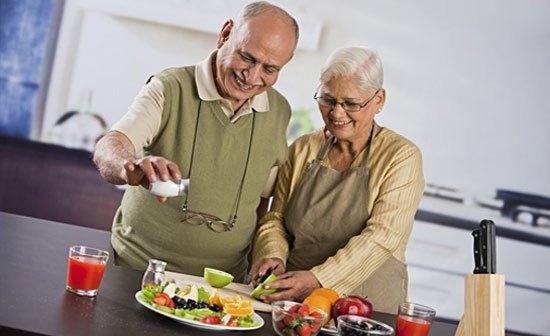Eating good nutritious food at every age is as important as exercise and sufficient rest. Eating healthy food becomes more important as we age because all our organs start degenerating. Obesity, hypertension and diabetes are some of the lifestyle diseases which affect the elderly. They can be prevented and controlled with the right kind of meal planning.
Ageing is inevitable and irreversible and therefore should not be frowned upon. The degenerative diseases like osteoporosis and dementia can adversely affect the quality of life as we grow older. By making certain lifestyle changes and modifying our daily diet to include more nutritious but light on the stomach meals, we can continue to enjoy healthy ageing.
The physical activity of the elderly decreases bringing down their metabolism too. Therefore, a smaller quantity of food is required to compensate for the lack of usage of energy. However, Vitamins like E and C are required along with lots of minerals to protect the elderly from diseases like cancer, heart diseases and cataract. Four to five helpings of vegetables and fruits every day provide adequate nutrients.
As the elderly have dental problems, due to which they are not able to chew their food properly, they may not be getting sufficient nutrition. In such cases, supplements are recommended.
The digestive system of the elderly weakens and therefore, they are unable to digest their food properly they had always relished. The elderly commonly complain about heaviness in the stomach, gastric problems and acidity.
Meal planning for the elderly is different from the active youngsters and therefore, should be done keeping in mind their changed requirements.
The foods that give energy like chapati, rice, sugar, ghee etc should be reduced gradually for the elderly because their metabolism decreases the following reduction in physical activity. This makes it difficult for them to completely digest it. However, the requirement of protein remains the same, more or less. Therefore, milk, milk products, eggs, meat, fish, chicken, pulses and nuts should be included in their daily diet. One should not go overboard because most of these also have lots of fat and harmful cholesterol. Sugar and refined cereals should be substituted with whole cereals, pulses, fibre rich fruits and vegetables as much as possible. Fats found in fish, soy, linseed, canola seed and oil, seaweed and green leaves are healthy fats and should be given preference over saturated fats. Consumption of fried foods, rich pastries and fatty meats should be kept to a minimum.
Osteoporosis or weak bones is a major health problem that most elderly face. It can be prevented or delayed by adequate calcium and Vitamin D in the body. In a hot, sunny country like ours, regular and sufficient exposure to sunlight is not a problem. Vitamin D is thus produced by the body but in case it is found not to be enough, supplements of the same should be given. Milk and milk products, green leafy vegetables and sesame seeds are some of the calcium-rich foods which should be included in the daily diet. Green leafy vegetables are also a good source of iron and so prevent anaemia in the elderly. Jaggery is another rich source of iron which provides a good change in flavour too.
Green, leafy vegetables also have Vitamins A, C and folate which prevent vascular diseases. Anti-oxidant properties are found in those vegetables and fruits which have bright green, orange and yellow colours. Vitamin C is found in citrus fruits and cabbage, green chillies, amla, guava and sprouted pulses. Pork, liver, pulses, groundnuts and oilseeds are rich sources of folate. Something from each of the above mentioned fruits and vegetables must be included in everyday meal of the elderly so that they get sufficient nutrition. Green tea, red wine, garlic, tomatoes are rich in phytochemicals which lower the risk of lots of health problems. Therefore, they should be consumed regularly too.
It is important to have variety in food so as to get sufficient nutrients and also to escape boredom. Different vegetables, fruits, nuts and seeds should be rotated during mealtimes so as to get nutritious, healthy and interesting food. Try to include traditional and seasonal food as much as possible but avoid excessive usage of pickles, herbs and spices. Also, avoid fried, fatty and very sweet foods so as to make digestion easier. Regular mealtimes must be followed to ensure a healthy lifestyle. Soft, well-cooked foods should be eaten if one has dental problems. Otherwise, boiled, grated or stewed food is also a good option to enjoy your favourite food.
Include fibre-rich foods like whole cereals, pulses, vegetables and fruits to regulate bowel movement. Drink sufficient fluids to prevent dehydration. Alcohol may adversely interact with your medication and therefore, its intake should be limited as per the advice of the doctor. Always eat clean and fresh food to avoid stomach ailments. Exercise regularly and lead an active life.
Obesity in old age very often leads to arthritis, heart disease, diabetes and many other similar ailments. So it is very important to keep track of whatever you eat. Nutritious, fresh food at regular mealtimes together with physical activity can prevent or delay lots of health problems leaving you free to enjoy your old age.
written by Avni Kaul – Nutritionist and Wellness Coach


